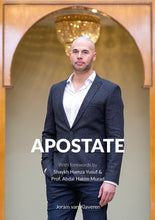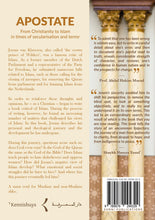Apostate
From Christianity to Islam
in times of secularisation and terror
by Joram van Klaveren
Forewords by
Shaykh Hamza Yusuf
& Prof. Abdal Hakim Murad
First Edition 2019
’t Kennishuys & Sunni Publications
Den Haag | Rotterdam
Paperback, 200 pages, 305 grams
ISBN 978-90-79294-32-9
Joram van Klaveren, also called ‘the crown prince of Wilders’, was a famous critic of Islam. As a former member of the Dutch Parliament and a representative of the Party for Freedom, he submitted numerous bills related to Islam, such as those calling for the closing of mosques, for removing the Quran from parliament and for banning Islam from the Netherlands.
In order to reinforce these thoughts and opinions, he — as a Christian — began to write a book critical of Islam. During the process of writing, however, he found an increasing number of matters that challenged his views of Islam. In this book, Joram describes his personal and theological journey and the development he has undergone.
During this journey, questions arose such as: does God even exist? Is the God of the Quran the same as the God of the Bible? Does Islam teach people to hate disbelievers and oppress women? How did Joram’s negative view of Islam develop? What emotional and social struggles did he have to face? And where has this journey eventually led him?
A must read for Muslims and non-Muslims alike.
“Joram’s sincerity enabled him to shift his perspective, to remove the blind spot, to look at something objectively, and to really try and understand it on its own terms. This led to an extraordinary search, the result of which is the book that you are now reading. This book tells the story of an uncommon trajectory, the journey of a man from animosity to charity, from despair to hope, and from belligerence to peace.” —Shaykh Hamza Yusuf
“To admit that one has been wrong is seldom easy, but to write in careful detail about one’s error, and then to document one’s painful road to truth, reveals considerable strength of character, and restores one’s confidence in human nature and in the prospects for change.” —Prof. Abdal Hakim Murad




